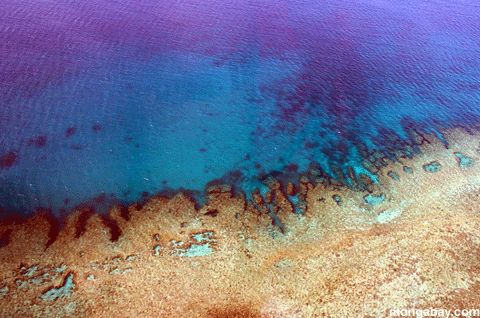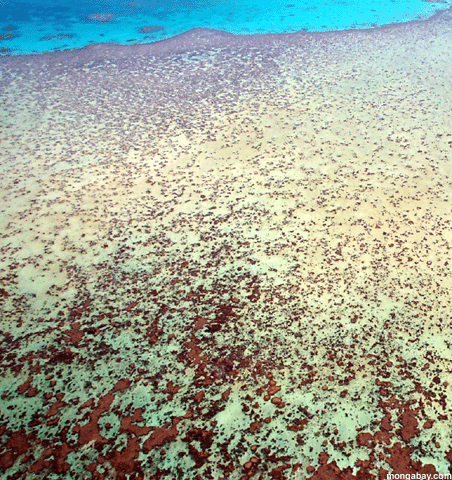Coral reefs survive tsunami relatively unscathed, report finds
April 15, 2005
According to an assessment released last week by Coral Cay Conservation — an not-for-profit organization based in London — coral reefs (more) suffered only minimal damage from last December’s Indian Ocean tsunami. The study found that, at worst, only 8% of pre-tsunami coral coverage will ultimately have been lost, even if all of the tsunami-damaged coral dies.
The discovery contradicts initial reports suggesting that the region’s reefs were devastated by the disaster, which killed around 300,000 people and caused billions in losses to Indonesia, Thailand, Malaysia, India, and Sri Lanka.
 |
During February and March, Coral Cay Conservation surveyed 28 kilometres of reef in Surin Islands Marine National Park located in the Andaman Sea about 60 kilometres off the western coast of Thailand, a area that experienced the full force of the tsunami. A team of Coral Cay Conservation marine scientists conducted “underwater surveys around the islands; the first week spent identifying and quantifying specific indictors of tsunami-induced damage, the second undertaking a preliminary assessment of the current state of the extant marine resources of the islands” according to the organization’s April 6th release.
The report notes that there are encouraging signs of coral regrowth and “it would appear that healthy coral reef systems such as those of Surin can begin to regenerate rapidly even in the aftermath of a natural event as momentous as a tsunami.”
Coral Cay Conservation
Founded in 1986, Coral Cay Conservation is a not-for-profit organisation that sends teams of volunteers to survey some of the world’s most endangered coral reefs and tropical forests with a goal of protecting these crucial environments by working closely with the local communities who depend on them for food and livelihood. The organization is largely financed by volunteers who pay to participate in an expedition for anything from 2 and 12 weeks. Coral Cay Conservation currently has coral reef expeditions in Fiji, Honduras, Malaysia and the Philippines and forest expedition in Malaysia and the Philippines.
For more on the assessment, please visit http://www.coralcay.org/archives/2005/04/06/13.20.43.php
Coral Reefs
 |
Coral reefs are often called the “tropical rainforests of the sea” for their astounding richness of life. Due to their structural complexity, corals are one of the most productive ecosystems on Earth, providing important services to mankind including fisheries, coastal protection, medicines, recreation, and tourism.
Corals are tiny animals that live in colonies and derive nourishment and energy from a symbiotic relationship with zooxanthellae algae. Coral reefs are formed over the course of thousands of years as limestone skeletons constructed by corals accumulate and form a structural base for living corals. Scientists estimate reefs provide a home for millions of species – from brightly colored tropical fish to sea cucumbers which produce anti-cancer compounds.
Like tropical rainforests, coral reefs are imperilled by human influences. Coral reefs are particularly fragile ecosystems, partly due to their sensitivity to water temperature. When corals are physiologically stressed – as is the case when water temperatures are elevated – they may lose much of the their symbiotic algae, an event known as “bleaching.” Corals can recover from short-term bleaching, but prolonged bleaching can cause irreversible damage.
In 1998, when tropical sea surface temperatures were the highest in recorded history, coral reefs around the world suffered the most severe bleaching on record. 2002 was even worse: nearly 60% of the 135,000 square mile Great Barrier Reef suffered some bleaching. It is estimated that even under the best of conditions, many of these coral reef ecosystems will need decades to recover.
Although reefs face other threats from pollution, industrial activities, overfishing, siltation, cyanide and dynamite fishing, and anchors, it is global climate change that most concerns scientists.
Further reading:
Coral Reef Decline Began Centuries Ago